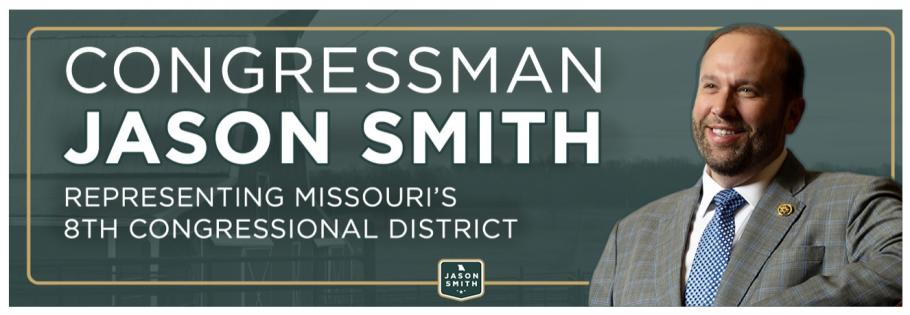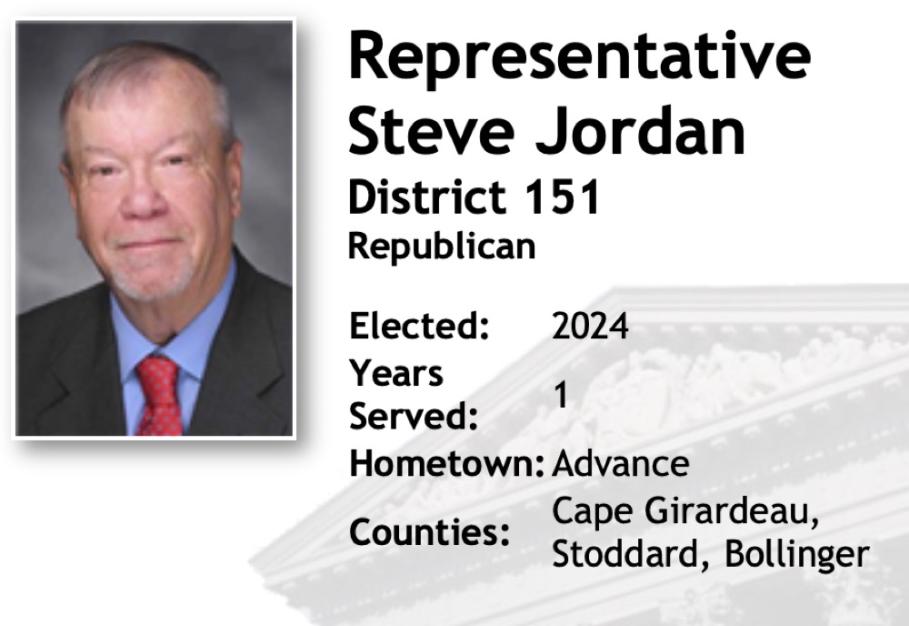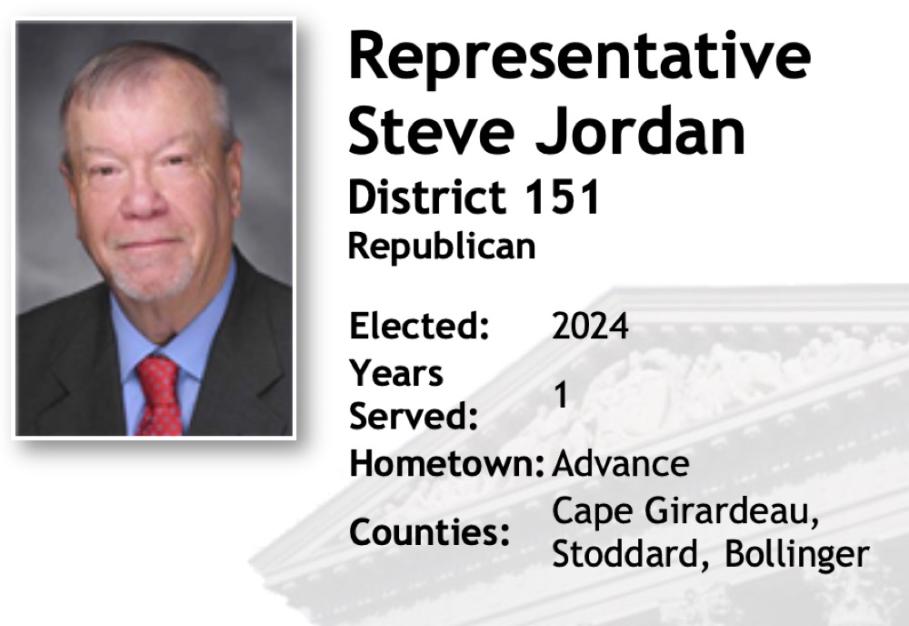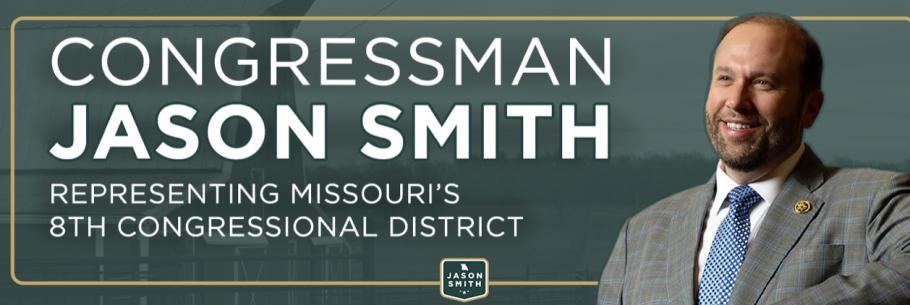
Friends, I am running for re-election as Alderman, Ward 2 and I am asking for your vote and support. The election will be held Tuesday, April 8th at the Bearcat Center.
These are uncertain times and I believe my 24 years on the City Council and background in community banking make me uniquely qualified to continue serving you.
My overall guiding principal is the financial stability of Dexter. For decades, we have balanced our budget and maintained a reasonable reserve fund. Great care needs to be taken to keep our city financially secure.
My sincere thanks to the community leaders who have endorsed my re-election:
Mark Snider, Bryce Matthews, and Dr. Ray Dowdy
My wife, Lesa and I have lived in Dexter our entire adult lives and
know most of you through our banking careers. We care about the
future of Dexter and ask for your vote on April 8th.
Thanks,
Tim Aslin

|
Rep. Smith, Missouri Delegation Urge Federal Disaster Declaration Following Missouri Tornados |
|
WASHINGTON – Today, Representative Jason Smith (MO-08), along with Rep. Wesley Bell (MO-01), Senators Josh Hawley (R-MO) and Eric Schmitt (R-MO), and Reps. Ann Wagner, Sam Graves, Mark Alford, Eric Burlison, Emmanuel Cleaver, and Bob Onder led a letter to President Donald J. Trump respectfully requesting he grant Governor Mike Kehoe’s request to immediately authorize a federal disaster declaration in 28 Missouri counties impacted by recent severe weather and make available federal assistance to support Missouri’s recovery efforts. Representative Smith said, “The devastation in Missouri caused by severe weather, violent tornadoes, and widespread flooding in recent weeks is heartbreaking and has left many communities in Southeast Missouri struggling to get back on their feet. I applaud Governor Kehoe’s swift action to declare a State of Emergency in Missouri to enable first responders, road crews, and emergency management officials to begin initial damage assessments, and alongside my colleagues, respectfully urge the federal government to follow suit. The severity of this disaster necessitates a coordinated response from both the state and federal governments to begin deploying vital aid, including shelter assistance and other desperately needed recovery efforts.” Joining Representatives Smith and Bell and Senators Hawley and Schmitt in signing the letter to President Donald Trump are Missouri Representatives Ann Wagner (MO-01), Bob Onder (MO-03), Mark Alford (MO-04), Emmanual Cleaver (MO-05), Sam Graves (MO-06), and Eric Burleson (MO-07). The request from Governor Kehoe was for assistance in cleaning up after the storms that impacted Missouri from March 14-15 this year. |

Greetings Friends of the 151st District!
Session is halfway done as us Legislators were on Spring Break this week. We received a break from being in Jefferson City so we could work in the district with our constituents. It was great to be back in the district, but our Spring Break started off with strong winds and various tornados throughout the southern half of our state. If you need any help, please do not hesitate to contact our office. My office is always available for you.
Missouri Legislature Returns to Finalize FY 2026 Budget and Key Investments
With spring break now behind us, the Missouri Legislature returns to Jefferson City this week to begin the final eight weeks of the session. The most pressing task for lawmakers is to pass the Fiscal Year 2026 state operating budget. Over the past several months, the Missouri House Budget Committee and its appropriations staff have been working diligently on the budget recommendations presented by Governor Mike Kehoe in late January, which carries a nearly $54 billion price tag. These recommendations prioritize strategic investments in key areas such as public safety, economic development, agriculture, education, healthcare, mental health, and services for veterans and military personnel. The goal is to strengthen Missouri’s infrastructure, enhance residents’ quality of life, and foster long-term growth across the state.
Among the proposals, public safety remains a top priority, with $12.8 million allocated for a new crime lab in Cape Girardeau to improve investigative capabilities, $10 million dedicated to police training and equipment enhancements through the Blue Shield Program, and $25 million set aside to support crime victims. Additionally, the legislature will consider funding on reducing crime, bolstering law enforcement, and enhancing community safety initiatives.
Economic development efforts include $161.5 million for childcare subsidies and innovation grants aimed at expanding access for working families. Infrastructure improvements are also a focus, with $60 million earmarked for rural road enhancements to ensure safe and efficient transportation. Missouri’s role on the global stage is highlighted through a $40.5 million investment in preparations for the 2026 FIFA World Cup.
The budget proposes spending $4 billion on the foundation formula in fiscal 2026, and also includes $50 million to expand a scholarship program for private schools. Education funding sees a substantial boost, with $200 million in new funding for public schools, $33.4 million to fund increased base salaries for teachers, $16.8 million to increase support for higher education and $15 million to continue fully funding public school transportation needs. Additional resources will support smaller districts through small school grants, while expanded Fast Track Scholarships will provide opportunities for adults in high-demand fields to strengthen the state’s workforce.
Healthcare and mental health services receive critical funding, with $149 million allocated to eliminate waitlists for developmental disability services, $71.6 million directed toward expanding behavioral health services statewide, and $17.9 million set aside for early childhood intervention programs.
In the agricultural sector, $55 million in bonding will modernize livestock facilities at the Missouri State Fair, while additional funding will expand meat and poultry inspection programs to ensure food safety and support local producers.
Missouri’s commitment to veterans and military personnel is evident in the $10 million investment to improve veterans’ homes and healthcare systems, ensuring those who have served can receive the quality care they deserve.
As lawmakers return to Jefferson City, these budget proposals will take center stage, shaping the future of Missouri and advancing initiatives that benefit communities across the state. The Budget Committee is expected to move quickly and get the appropriations bills to the House floor within the next few weeks, aiming to have them passed out of the House and headed to the Senate in early April.
For updates on the committee’s progress and ongoing budget discussions, visit house.mo.gov/Budget.aspx.
Governor Signs FY 2025 Supplemental Budget Bill
Governor Mike Kehoe signed the FY 2025 supplemental budget bill, HB 14, ensuring the continued operation of state government. Totaling over $1.9 billion, including $391.5 million in general revenue and $1.4 billion in federal funds, the bill supports key services across Missouri. It allocates $157.4 million for public school funding, $20.8 million for special education services, and $16.5 million for the First Steps program. Additionally, $14 million will support senior services such as meals and in-home care, while law enforcement efforts receive funding for immigration enforcement training and expanded drug and crime investigations. Governor Kehoe emphasized the bill's role in sustaining education, special needs services, law enforcement, and senior care, ensuring vital resources reach communities statewide.
Governor Kehoe Requests Damage Assessments to Secure Federal Disaster Aid Following Devastating Tornadoes
A devastating outbreak of tornadoes and severe storms swept through Missouri on March 14-15, claiming 12 lives, leaving one person missing, and causing widespread destruction across more than two dozen counties. The storms leveled homes, schools, and businesses, leaving hundreds of structures damaged or destroyed. At its peak, the disaster knocked out power to over 140,000 homes and businesses, while 101 roads were closed due to debris, flooding, and structural damage.
Governor Kehoe has requested the Federal Emergency Management Agency (FEMA) to conduct joint preliminary damage assessments (PDAs) in 23 affected counties. This step is crucial in securing federal disaster assistance for impacted communities.
Starting Thursday, March 20, six PDA teams—including FEMA, SEMA, the U.S. Small Business Administration, and local emergency officials—will assess the damage to determine if Individual Assistance can be requested. This aid would provide federal support for temporary housing, home repairs, and the replacement of lost belongings and vehicles.
Initial assessments estimate 368 homes were destroyed, 356 sustained major damage, and 1,058 had minor damage. Ongoing evaluations of roads, bridges, and public infrastructure may lead to additional requests for Public Assistance.
The National Weather Service (NWS) has confirmed at least 12 tornadoes across Missouri, ranging from EF1 to EF3, impacting multiple counties, including:
- EF1: Franklin County (Elmont to Union)
- EF1: Jefferson County (Klondike Rd)
- EF1: Webster County (near Seymour)
- EF1: Oregon County (near Rover)
- EF2: Franklin/St. Louis counties (Villa Ridge to Fox Creek)
- EF2: Jefferson County (Hillsboro to Arnold)
- EF2: St. Louis County (Bridgeton)
- EF2: Phelps County (Doolittle to Rolla)
- EF2: Dunklin/Pemiscot counties
- EF3: Iron County (Des Arc)
- EF3: Butler County (Poplar Bluff)
- EF3: Ozark County (Bakersfield)
Outages continue to decrease as power has been restored, as the wake of the storm left thousands of Missourians without power. The State Emergency Operations Center remains activated to assist in the recovery process, assess ongoing needs and coordinate resources as requested by local partners and emergency management.
Volunteer and faith-based organizations, including the Red Cross, Missouri Baptist Disaster Relief, Convoy of Hope, and the Salvation Army, are providing meals, shelter, and emergency supplies. Missourians in need of assistance can contact United Way at 2-1-1 or the Red Cross at 1-800-733-2767. Additional disaster recovery resources, including housing and mental health services, are available at recovery.mo.gov.
Join Us for Missouri House of Representatives Veterans Recognition Day
The Missouri House of Representatives invites you to a special Veterans Recognition Day on Thursday, March 27, 2025, from 8:30 AM to 9:30 AM in the 1st Floor Capitol Rotunda. This event honors the bravery and sacrifices of Missouri’s veterans and provides an opportunity for State Representatives to connect with their veteran constituents.
Veterans can receive assistance from a Missouri Veterans Commission Veterans Service Officer, who will be available to answer questions and provide support. Several organizations will also be present to share valuable resources, including the Missouri Department of Mental Health, The Follow-On Mission, Harry S. Truman Memorial Veterans’ Hospital, Heroes Outreach Program, and the Columbia VET Center.
Veterans who wish to be recognized in the House Chamber will be escorted to the 4th floor gallery for a special introduction during the legislative session.
Join us as we celebrate and honor the service of Missouri’s veterans. We look forward to seeing you there!
If any of you want details on legislation we pass, please email me a request to Steve.Jordan@house.mo.gov. If you ever have, any questions or concerns feel free to call me at 573-751-1494.

Greetings Friends of the 151st District!
Things are starting to pick up here in Jefferson City. Bills are moving through committee, and we are able to vote on them on the house floor.
Five weeks into the 2025 legislative session, the Missouri House of Representatives has passed its first set of bills, focusing on key reforms to improve business conditions, protect individual freedoms, and enhance public services across the state. I am excited to share that I have voted for HBs 737 & 486, 594 & 508, 595 & 343, and 75.
Among the legislation passed, HB 737 & 486 ensures foster children retain their rightful benefits and introduces important child welfare reforms. HB 594 & 508 seeks to eliminate the state income tax on capital gains, aiming to boost economic growth. HB 595 & 343 limits local government regulations on landlords, preserving property rights. Meanwhile, HB 75, the 'Missouri Religious Freedom Protection Act,' reinforces protections for religious gatherings, preventing undue government interference. With these measures now heading to the Senate, lawmakers continue to push forward on critical issues affecting Missourians statewide.
House Passes Legislation to Address Child Welfare Issues
The Missouri House has passed out its first bill this session, making good on the promise of Speaker Jon Patterson, who said on the first day of the legislative session that legislation dealing with our state’s child welfare system would be the first bill passed out of the House and sent to the Senate.
HB 737 & 486 addresses several key issues related to children in the custody of the Children’s Division. The bill introduces changes to how benefits are managed for children in state custody, emphasizes consideration of religious faith in placement decisions, and clarifies circumstances under which children may engage in independent activities.
Currently, an estimated 1,200 young people in Missouri’s foster care system are eligible for benefits from the Social Security or Veterans Administrations, or railroad retirement benefits, often because they are the survivors of deceased parents or because they have disabilities. The state Children’s Division takes those benefits to cover the costs of caring for those children. Social Security benefits, alone, can be around $900 or more each month.
Several lawmakers expressed shock that this practice exists, calling it a misuse of funds meant to support foster children. Bipartisan support for the bill was strong, with lawmakers and advocates condemning the current practice of seizing benefits as harmful to vulnerable children. This bill would end Missouri’s practice of seizing those benefits from foster children to offset state care costs, ensuring these funds are used for the children’s unmet needs or future independence.
The bill includes two other provisions:
One would specify that the offense of abuse or neglect of a child does not include letting a child do things like going to school or nearby locations on foot or by bicycle; play outside; or stay at home for a reasonable amount of time without supervision. Any such “independent activities” must be deemed appropriate for the child’s age, maturity, and physical and mental abilities.
The other would require the Children’s Division to attempt to place a child in its care with a person, agency, or institution governed by persons of the same religious faith as that of at least one of the child’s parents. Missouri Courts must already do so. The bill would require that the Division follow the same procedure.
After passing with a vote of 149-1 in the House, the bill now heads to the Missouri Senate for further consideration. Advocates hope that the passage of this legislation will bring Missouri in line with other states that have already ended the practice of seizing foster children’s benefits.
House Signs Off on Proposal to Eliminate the State Income Tax
The Missouri House advanced HB 594 & 508 this week, a bill that would grant a full income tax deduction for federal capital gains starting in 2025. Under the proposal, taxpayers could deduct 100% of capital gains reported on their federal tax returns for state income tax purposes.
Republican legislators have highlighted cutting taxes as a top priority for the 2025 legislative session and are committed to ensuring Missourians keep more of their income. Supporters argue the measure will boost economic growth, create more high-paying jobs for residents, attract more businesses, and make Missouri more competitive with neighboring states by encouraging reinvestment and productivity. They also claim it benefits a broad range of Missourians, including retirees.
However, opponents warn that eliminating capital gains taxes would create a budget shortfall with no mechanism to replace lost revenue, potentially harming funding for essential public services.
With a House vote of 100-48, the bill now moves to the Missouri Senate for further consideration.
House Passes Bill Protecting Religious Gatherings from Government Restrictions
HB 75, known as the "Missouri Religious Freedom Protection Act," passed out of the Missouri House this week. The bill ensures that religious groups and places of worship can hold services or meetings without government interference. It prohibits public officials from issuing orders that would limit or ban such gatherings, with exceptions only in cases of imminent danger, such as natural disasters or hazardous material incidents. The bill also clarifies that religious groups using places of worship to plan or commit violence are not protected, and places of worship must still comply with building and fire codes.
Supporters of the bill argue that religious freedoms were unjustly restricted during the COVID-19 pandemic when some states allowed other businesses, like casinos, to remain open while limiting church gatherings. They believe the bill adds an essential layer of protection for religious practitioners, particularly for mental health reasons linked to regular church attendance.
Opponents contend that the bill could go too far by limiting the ability of public officials to protect their communities during emergencies. They also claim that the bill’s language could unintentionally restrict the practice of religion, the very thing it aims to protect.
With a vote of 106-38 in the House, the bill now heads to the Missouri Senate for further debate.
House Passes Bill Limiting Local Regulations on Landlords
The Missouri House passed HB 595 & 343 this week, a bill restricting local governments from imposing certain regulations on landlords. The legislation prohibits cities and counties from requiring landlords to accept Section 8 housing vouchers, limiting how they screen tenants, capping security deposits, or mandating a tenant’s right of first refusal on a rental property. However, it does allow voluntary agreements between local governments and landlords to regulate rent for subsidized housing.
Supporters argue the bill protects landlords’ rights and prevents measures like Kansas City's ordinance, which forces landlords to accept housing vouchers. They claim it maintains the status quo, supports small landlords, and expands rental opportunities.
Opponents counter that the bill undermines efforts to address affordable housing challenges by making it harder for voucher holders and low-income families to secure housing. They point to Kansas City’s $1 million risk and mitigation fund designed to offset potential losses for landlords participating in the voucher program.
The bill now heads to the Missouri Senate for further consideration.
If any of you want details on legislation we pass, please email me a request to Steve.Jordan@house.mo.gov. If you ever have, any questions or concerns feel free to call me at 573-751-1494.


